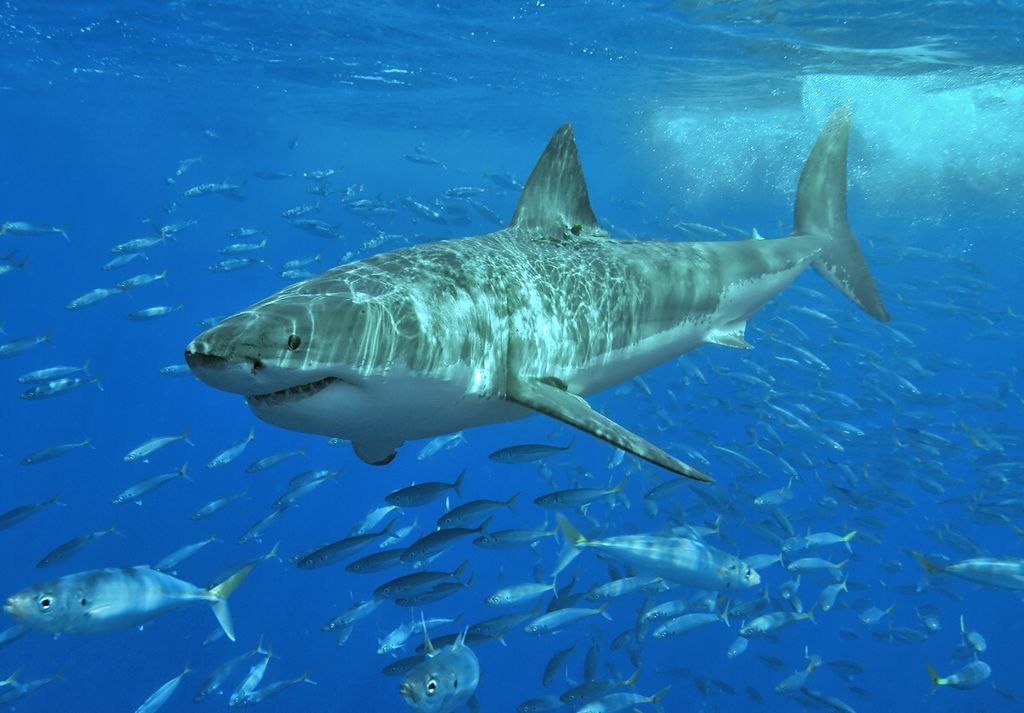
Photo by Terry Goss, copyright 2006. Taken at Isla Guadalupe, Mexico, August 2006.
Discovery Channel’s flagship programming, “Shark Week”, came under fire for its 2013 documentary entitled Megalodon: The Monster Shark Lives, and they’re at it again this year. Last year’s heavily scrutinized program, The Monster Shark Lives, featured actors pretending to be scientists, photoshopped and altered pictures, and fake digital video. At no time in the “documentary” was it mentioned that the feature itself was fictional except for a vague, rapidly removed disclaimer, causing many viewers to actually come to believe that these ancient animals are still alive today. Discovery Channel even had the gaul to host an online poll and announce that at the time, 73 percent of viewers thought that the giant megalodon was not really extinct. Conservation activists have been upset at Shark Week’s overt focus on “shark attack” specials rather than on conservation efforts for a group of animals of which 25 percent are threatened with the real possibility of extinction. Learn more about shark conservation here.
Instead of focusing on the science behind the sharks and trying to inform viewers on the behavior and history of sharks for this year’s special, Discovery Channel chose to air Shark of Darkness: The Wrath of Submarine, for their prime time event on the opening night of Shark Week. This year’s program also turned out to be a fake documentary, using made up events while inventing people that don’t actually exist. The fear-mongering show focused on the legend of a thirty foot great white shark named Submarine that has been terrorizing residents off the coast of South Africa. Submarine is an urban legend from the 1970’s about a massive great white shark in False Bay, created by journalists who wanted to see how easy it would be to fool the average newspaper reader!
The fake-u-mentary is supposedly based out of Hout Bay, South Africa, but repeatedly shows a map of Dyer Island and Geyser Rock and also refers to Shark Alley which are all in the completely unrelated area of Gansbaai, tens of miles to the east.

Map showing distance between Hout Bay and Dyer Island. via Southern Fried Science
Yet again, an all-too-quick disclaimer failed to inform a large section of the audience that the program was actually fictional. However, even more disturbing was the Monster Hammerhead feature which claimed to document shark scientists as they intended to tag a legendary, massive hammerhead off the Florida coast. It turns out the program misrepresented not only the scientific work being done, but also the animals being studied. Worse, the scientists that appeared on the show were tricked into filming and led to believe they were being interviewed about their conservation efforts.
Misinformation being labeled as fact on this large of a scale has a real impact. Shark Week “documentaries” attract viewership in the tens of millions of people, and they create almost twice as much Twitter conversation as the infamous “Red Wedding” episode of Game of Thrones.
On the other hand, Discovery defends their programming by claiming that they are giving their viewers what they want as this year’s flagship show broke 27 year old viewership records according to the network. Discovery also partners with a variety of conservation organizations, and it is undeniable that Shark Week is the catalyst for millions of people to broaden their awareness of these misunderstood creatures while allowing conservation organizations attention they would otherwise not be able to receive. However, Discovery’s audience is voting against such over sensationalization of programs with their viewership. Viewership, TV ratings, and social media interaction are down from last year with a large portion of the social media chatter turning negative. It remains to be seen if Discovery will listen to their audience and begin to produce legitimate, educational, scientifically backed programming for future Shark Weeks.
With so much real, exciting shark science being conducted on a daily basis around the world, it begs the question: why make anything up at all?
Let us know where you stand on the issue!































